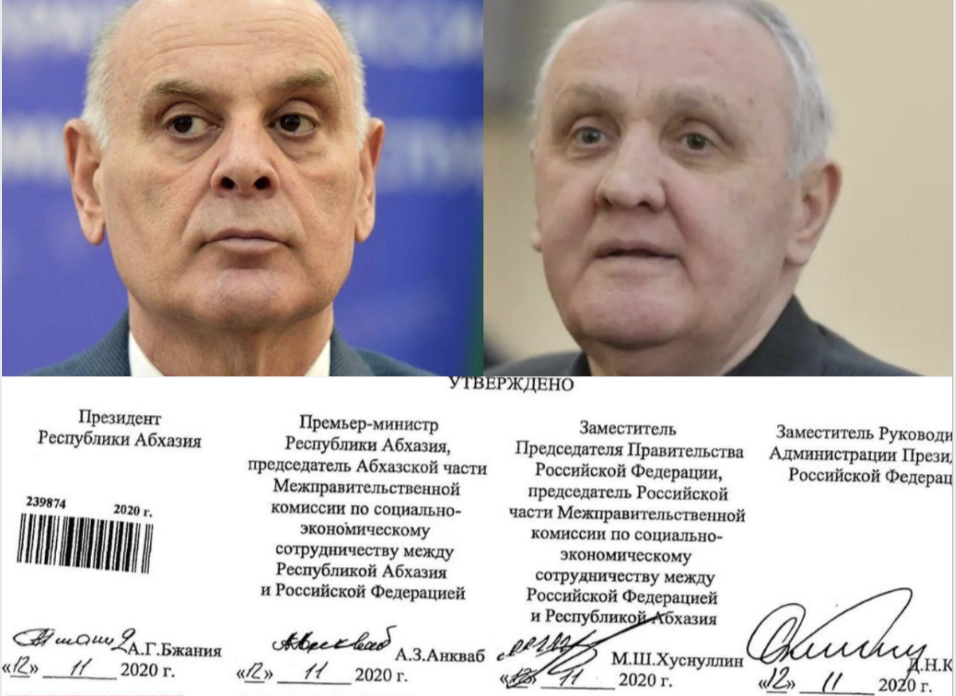საერთო ცხელი ხაზი +995 577 07 05 63


The desire of the Russian Federation to fully absorb the economic resources and strategic territories of Abkhazia is becoming more aggressive. This tendency was significantly intensified after the war against Ukraine. The local population and civil society of Abkhazia showed critical resistance to this process via massive self-organizing. Russia’s response to the protest is the coercive act of threatening to cut social and economic aid to the Abkhazian Budget.
During the last several days, Abkhazian oppositional telegram channels have shared a protocol from a meeting between the de-facto president of Abkhazia, Aslan Bzhania, and the deputy of administration of the President of the Russian Federation, Dimitri Kozak. The authenticity of the document has not been proven. However, this document already caused heated discussions in the political and public life of Abkhazia. According to locals, it shows the crisis in Russia-Abkhazia relations that could not be resolved by the current de-facto government. The document shows that Moscow plans to pause financial aid to Abkhazia from the First of September, 2024 until the Abkhazian side does not fulfill the following:
It is worth mentioning that the Russian aid to the Abkhazian social and economic budget makes up to three Billion 900 Million 732,7 Rubles. These funds cover salaries, pensions, and other vital programs. In total, 50% of the Abkhazian budget is comprised of Russian aid which has been decreasing, during the last few years.
Moreover, the above-mentioned protocol reveals that until September 20th, the de facto president has to send Moscow the list of MPs and opposition leaders who “have played a negative role against the interests of Russia and negatively affected Russian-Abkhazian relations.” Moscow plans to revoke the Russian Federation citizenship of these MPs and opposition leaders. Revoking citizenship for de facto government members is a well-tested method for Russia to increase its influence and remind Abkhazians who their ruler is. Several months ago, a similar case took place in the Tskhinvali region.
This information has already caused critical positions among the Abkhazian opposition and civil sector. The de facto Abkhazian president has been openly accused of implementing Russian interests, selling out the “sovereignty” of Abkhazia, and treason, on the other hand, Moscow has been accused of blackmailing.
The Abkhazian civil society has been actively fighting the large-scale annexation processes carried out by Russia in Abkhazia for the last few years and trying to stop them. Along with the ongoing war in Ukraine, Russia began to appropriate strategic resources and facilities in Abkhazia (Sukhumi Babushera airport, Bichvinti state cottages), which the Abkhazian society openly opposes. In July 2024, several Russian initiatives failed in the de-facto parliament of Abkhazia. The de-facto Parliament returned the so-called "Law of Apartments" to the initiators, and the agreement on investment projects was not ratified.
It is obvious that Abkhazia is entering a deadlock in its relations with Russia. The local population increasingly realizes that dependence on Russia does not give them the opportunity for independent development, and the ultimatums coming from Moscow are related to existential threats for them.
Unfortunately, despite the change in the context of the region and the fears and worries on the ground, no new dynamics can be seen in the peace policy of Georgia. During the current processes, Tbilisi has not even made a single serious statement on the topic of peace policy, if we do not include the propaganda and groundless pre-election statements about the restoration of the territorial integrity of Georgia.
According to the Social Justice Center, in the current political crisis, it is important that
The Georgian authorities and broader political actors should actively work on new peace strategies, which, among other things, will contribute to alternative economic programs and policies with Abkhazia and the emergence of new political and economic expectations for Sukhumi.
This policy must be planned and conducted with the support of Georgia's international partners, primarily the European Union, the main international supporter of peace policy in our region.
The website accessibility instruction